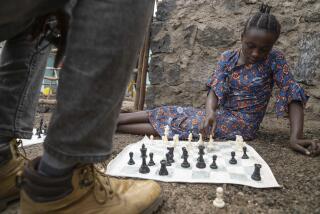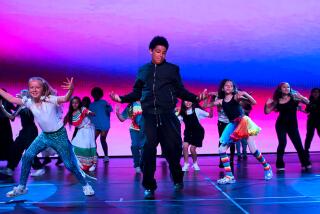Valuable Life Lessons on the Chessboard
- Share via
With the dogged focus most little boys reserve for shoot-’em-up video games or wheedling cookies from their mother, 7-year-old Zachary Ennis is staring at a chess board.
Every few seconds, his hand snakes out to shift a piece. Then he resumes his fixed gaze.
Like many of the 23 other children in the hourlong after-school chess class at Tustin Memorial Elementary School in Santa Ana, Zachary shows an intensity belying his age. That is, until their teacher declares the winners, losers and draws in a last-day-of-class chess tournament.
Zachary erupts in tears as his opponent looks on in sympathetic silence. “I thought I draw-ed!” the second-grader wails. None of the other boys laughs -- within the next hour or so, five others erupt in brief bouts of tears after poor showings.
Al Massip aims to teach students how to win and lose, but also to play with patience, forethought and focus, in the weekly after-school chess classes he runs at 51 schools in Orange and Los Angeles counties. At least 10 more schools plan to include his program next school year.
“We don’t just teach chess for chess’ sake,” Massip said. “The choices you make on the chessboard teach you skills for life.”
Woodsboro Elementary in Anaheim has offered chess classes through Massip’s program for three years. Providing structured chess instruction gives kids an opportunity they might not have otherwise, said Woodsboro Principal Kathy Chakan.
“We want to offer kids a more well-rounded experience,” she said. “Chess certainly refines some of the logic and thinking skills you need in life, and these classes let them develop those skills in a way that’s a little less academic and a lot more fun.”
Massip, 46, learned to play chess when he was 5, during a three-day detainment at the Havana airport before his family fled Cuba; he says it’s good for children to learn the game at a young age. Massip also runs a maintenance company, but his passion is the Orange County Chess Center, which he founded in Newport Beach in 1994.
Although Massip has never won a chess title, the young teams he coaches have earned national and state championships.
The chess players at Tustin Memorial take the game just as seriously as Massip. Well, most of them do.
The youngest student, 5 1/2-year-old Danielle Weniger, appears to enjoy swinging around a pole in the school computer lab as much as playing the game.
“I’ve won three games this year,” she crows when she sits back down, her legs swinging a few inches above the ground. “Against a guy in kindergarten who’s taller than me, and another guy, and I don’t remember the third.”
Danielle is still mastering piece movement. The other 11 children in the beginner class gently correct her when her rook strays a space too far or her bishop skitters in the wrong direction. And to even the playing field, her opponents always play without their queens.
Chess class isn’t just game-playing. The students have homework, and instructors frequently conduct short lessons on attacks and strategy.
For the beginners, instructor Jeff Eyler, 29, of Aliso Viejo teaches the fairly equal mix of boys and girls songs and stories to go along with the pieces so they remember what goes where and how it moves. For example, because the king is so old, he can move only one space in each direction.
“It’s a game. It’s supposed to be fun,” Eyler said. “I want them to enjoy it so they develop a passion for it.”
On the other end of the spectrum is advanced player Patrick Yu, a solemn bespectacled fourth-grader who moves his pieces after ponderous deliberation.
Patrick said he likes playing in countywide tournaments because he faces different opponents than his classmates, father or brother. Students in schools that hold Massip’s classes play in tournaments against other area schools.
“My friends know how I play and what I do, so they can win a lot of times because I use the same strategies,” he said. “That’s why class is cool, so I can learn how to attack differently.”
Zachary, who lost to Patrick in the third round of the tournament, said that he’s trying to learn how to lose gracefully but that his emphasis is on fine-tuning his wins.
“I have to work on getting the advantage from the beginning,” he said. “Every time, I get better and better, but it’s always just as much fun.”
Between turns, the kids in Mark Ayers’ advanced class -- all squirming young boys -- wriggle loose teeth, beg for fruit roll-ups or start playing handball. To keep their attention, Ayers moves the class tournament games along at a fast clip and frequently switches around the other activities.
He even offers $20 to any student who can beat him. No one does, but the boys stay quiet in thought for 15 minutes as they mull over moves and their possible consequences.
“I constantly have to challenge them to keep their minds active,” said Ayers, 39, of Ontario. “If I don’t, they get bored.”
Most of Massip’s 16 instructors have other jobs -- Ayers is also a bartender at a Newport Beach hotel -- but five, including Eyler, are able to support themselves by coaching full-time.
At some campuses with Massip’s programs, children can enroll for free because Parent Teacher Assns. fund the weekly chess classes. At others, including Tustin Memorial and Woodsboro, parents pay about $75 per month to enroll their children in the once-a-week program.
James Greenberg enrolled his first-grade daughter, Allison, in the Tustin Memorial classes this year, saying he jumped at the opportunity for her to learn the game at such a young age.
After four months of chess classes, Allison can concentrate for 30 minutes straight on a game, her father said.
On the last day of class, he watched as she played, brow furrowed and cowboy-boot-clad feet curled around the legs of her chair.
“She’s obviously using strategies and focusing, and she’s 6 years old,” Greenberg said. “It blows me away.”
More to Read
Go beyond the scoreboard
Get the latest on L.A.'s teams in the daily Sports Report newsletter.
You may occasionally receive promotional content from the Los Angeles Times.










